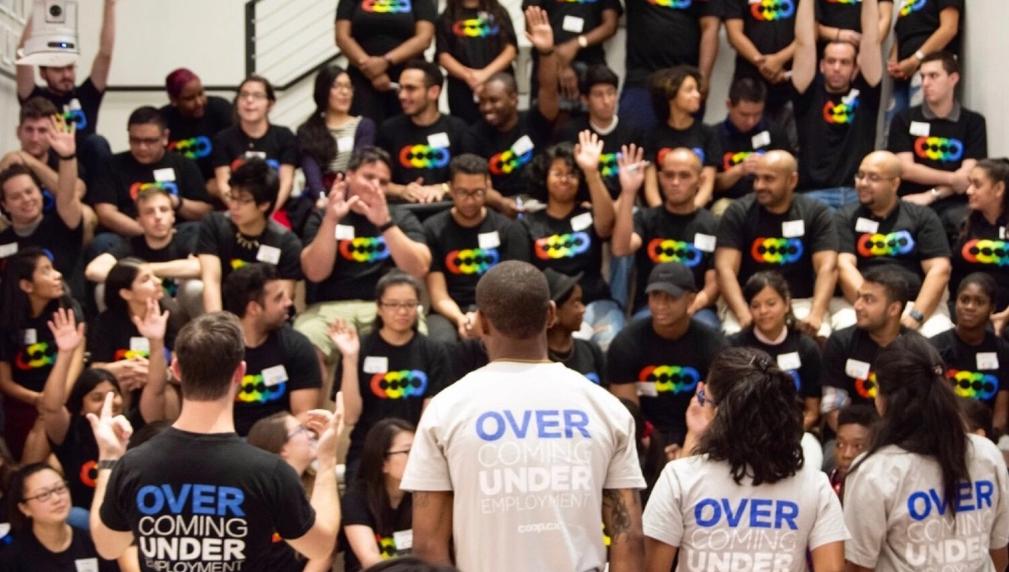COOP Careers LA Expansion
COOP’s (“ko-op”) mission is to overcome underemployment for underrepresented college graduates through digital skills and peer connections. Across our sites in New York and California, we’ve launched 100+ cohorts since 2014, welcoming 1,750+ alumni. 80% of alumni overcome underemployment within one year, earning an average of almost $60,000 after three years. Through this project, we look to scale our program to serve hundreds of first-generation Los Angeles college graduates, and prepare them for well-paying careers in the digital economy.

In which areas of Los Angeles will you be directly working?
County of Los Angeles
City of Los Angeles
What is the problem that you are seeking to address?
Nationwide, nearly half of recent college grads (ages 21-27) are unemployed or underemployed, and the rates are even higher for black college grads (Vox). With almost 400,000 Black and Latinx college graduates (NCES) entering the workforce every year, this underemployment crisis only stands to grow. This is a recipe to deepen national trends of downward mobility and wealth inequality for people of color (WaPo). Furthermore, informal relationships dominate our labor market. Referred candidates are nine times as likely to get hired (LinkedIn), and currently only 30% of employee referrals go to people of color (Payscale). We have learned that a Bachelor’s degree is necessary, but not sufficient. We need connections and referrals as much as skills. Ultimately, a labor market powered by relationships will reinforce the status quo. We believe that by cultivating social networks and closing the referral gap, we can make a significant impact on the underemployment epidemic.
Describe the project, program, or initiative that this grant will support to address the problem identified.
COOP’s flagship program is a unique digital apprenticeship: peer cohorts of 16 motivated, underemployed grads meet nightly for 16 weeks (200 hours) to learn technical skills, build community, and jumpstart careers in digital marketing and data analytics. COOP serves as connective tissue between universities and employers looking for diverse and qualified candidates. More importantly, COOP connects underrepresented college grads to each other. Below are descriptions of the flagship program’s key components: Community: Many underemployed recent grads feel a sense of isolation and COOP addresses this by recruiting cohorts of 16 recent college grads with common backgrounds and goals. We facilitate cohort bonding throughout the program. Captains: Each cohort is led by a team of four captains, returning COOP alumni who serve as coaches (in addition to busy day jobs). Captain teams teach 100% of COOP’s 200-hour curriculum, and they are the hallmark of COOP’s model. Curriculum: We design our curriculum with input from leaders and practitioners at our industry partners. The curriculum is divided into three parts: Head, Heart, and Hustle—digital “hard skills,” professional “soft skills,” and the grind of the job search. Connections: Finally, we work with employers to interview and hire COOP candidates. While we don’t guarantee positions, we are committed to making as many connections as possible. 200+ employers have hired COOP alumni since 2014.
In what stage of innovation is this project, program, or initiative?
Expand existing project, program, or initiative
Approximately how many people will be impacted by this project, program, or initiative?
Direct Impact: 160
Indirect Impact: 400
Describe how Los Angeles County will be different if your work is successful.
In the U.S., we’ve rapidly scaled higher education access (3x since 1970) and skills training (1M+ credentials), but have had lower upward mobility rates each decade since the 40’s. Across the LA-area CSU campuses, almost 20,000 new LA-area Cal State graduates will earn less than $20,000 annually 2 years after graduation. We know social capital plays an enormous role in the labor market with employee referrals being the largest source of hiring for employers and the most transformational (4-14x more likely to be hired with a referral) for candidates. If we want to revitalize higher education, we have to find ways to incorporate social capital building into the college-to-career experience, particularly for underrepresented populations. Through the successful scaling of our flagship program in Los Angeles, we can demonstrate the effectiveness of an inexpensive, social capital solution to underemployment that ensures generation LA college graduate launching upwardly mobile careers.
What evidence do you have that this project, program, or initiative is or will be successful, and how will you define and measure success?
Starting with our pilot, COOP’s program outcomes have been consistent. Over 90% of participants complete the program and 80% of all alumni are fully employed—earning $45,000 in year one and $75,000 by year four. A few insights have positioned us to solve underemployment: Overcoming underemployment in real time: COOP’s intervention is most effective for college graduates—right when they’re most isolated from each other and institutions, ready and motivated to seize full-time opportunities. Alumni leadership in our DNA: Since the end of our first year, every COOP cohort has been led by alumni captains that serve as near peer coaches. And equally important, most of the jobs our cohorts secure come through alumni referrals. Relationships over skills: We believe credentials matter less than relationships to achieve economic mobility. We have scaled access to skills training and education for low-income individuals, but not the social capital necessary to enter living wage industries.
Which of the CREATE metrics will you impact?
Employment in the tech industries
Income inequality
Unemployment rate
Indicate any additional LA2050 goals your project will impact.
LA is the best place to CONNECT